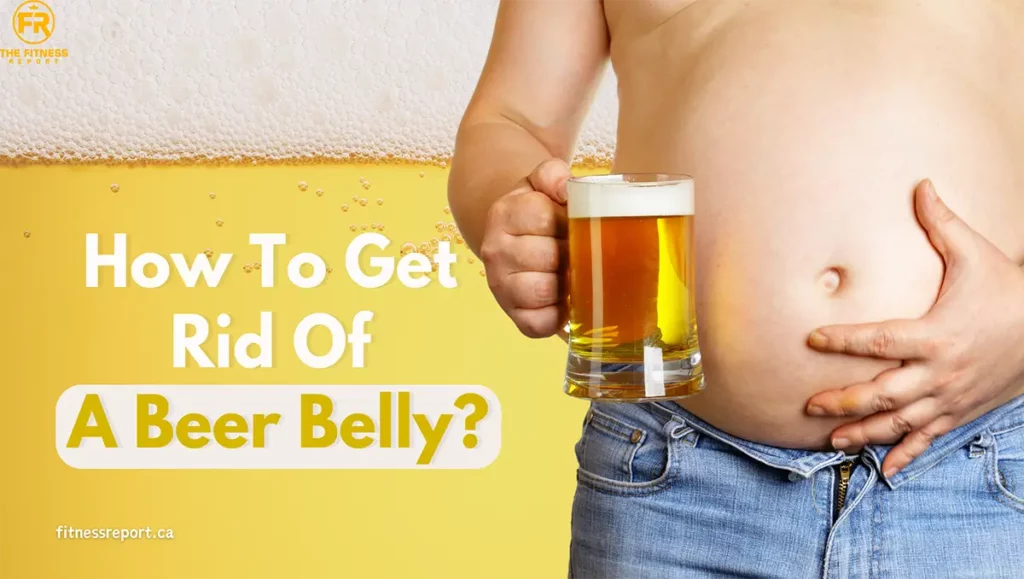How To Get Rid Of Beer Belly? Say Goodbye To Your Gut 👋
While sipping on a chilled lager or frothy ale might seem harmless at the moment, the cumulative effects of regular beer consumption can quickly manifest as an unsightly bulge around the waist. Beer, with its empty calories and propensity to disrupt metabolism, is a prime contributor to this abdominal fat. Want to learn how to get rid of beer belly? Keep reading 👇
But the good news is, with the right strategy and determination, you can combat and conquer this beer-induced bloat. Today we shall discover how you can reclaim your physique from the clutches of the notorious beer belly and promote a healthier lifestyle.
What Does Beer Belly Look Like?
A beer belly, often referred to as a “potbelly” or “spare tire,” is characterized by a pronounced bulging or protrusion of the abdomen. This distended appearance is especially noticeable when the surrounding areas, such as the chest and hips, are relatively leaner. The belly itself feels harder when poked, as opposed to a softer, flabbier tummy.
This is because abdominal distension is primarily due to fat accumulation around internal organs (visceral fat) rather than just beneath the skin (subcutaneous fat). The result is a rounded, protruding belly that can give the appearance of being permanently full or bloated. In some cases, a beer belly might also be accompanied by a “fatty apron,” a flap of fat that hangs over the waistline.
What Causes Beer Gut?
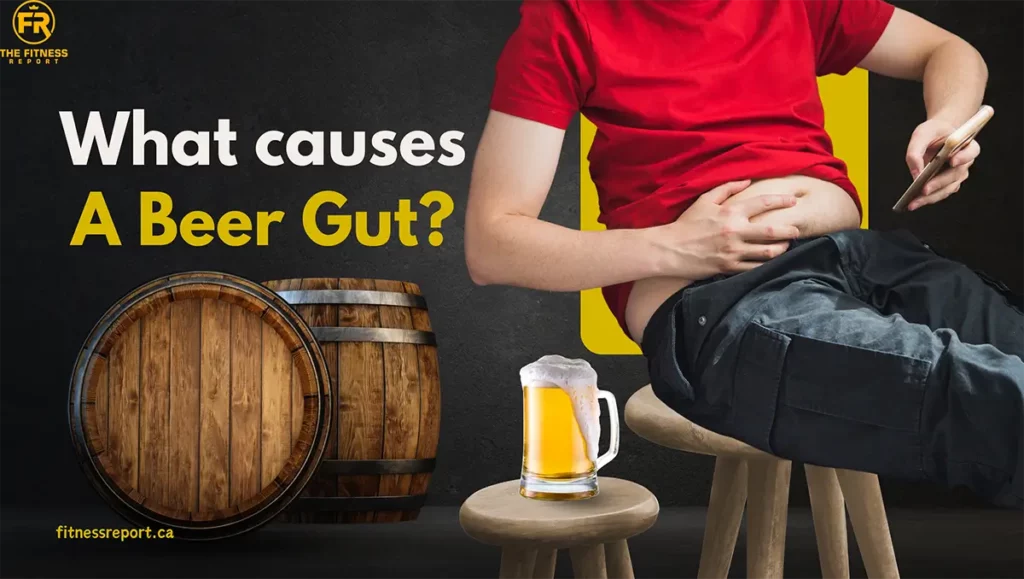
The term “beer gut” or “beer belly” suggests that excessive beer consumption is the sole culprit, but the reality is a bit more complex. Here are the primary factors contributing to the development of a beer gut:
Caloric Intake
Beer is calorie-dense, with the average can containing 100 calories or more. Consuming multiple beers in a sitting can lead to a significant caloric intake, and when these calories are not burned off, they get stored as fat.
Alcohol’s Impact On Metabolism
Alcohol can disrupt the body’s ability to burn fat. When consumed, the body prioritizes metabolizing alcohol over other macronutrients, leading to the storage of fats and sugars as adipose tissue.
Hormonal Changes
Alcohol can lead to imbalances in various hormones, including cortisol (a stress hormone) and insulin. Elevated cortisol levels have been linked to increased belly fat storage.
Poor Diet Choices
Often, beer consumption is accompanied by poor diet habits, such as snacking on salty, fatty, and unhealthy foods. This pairing amplifies the calorie intake and the potential for fat storage.
Visceral Fat Accumulation
Excessive alcohol consumption is linked to an increase in visceral fat, which is stored around internal organs. This type of fat is not only responsible for the protruding beer belly look but is also associated with a range of health risks.
Genetics
Some individuals may be genetically predisposed to storing fat in the abdominal region, making them more susceptible to developing a beer gut.
Sedentary Lifestyle
Lack of physical activity exacerbates the issue. Without regular exercise and aerobic activity to burn the excess calories from alcohol and associated snacks, the likelihood of developing a beer gut increases.
How Unhealthy Is A Beer Belly?
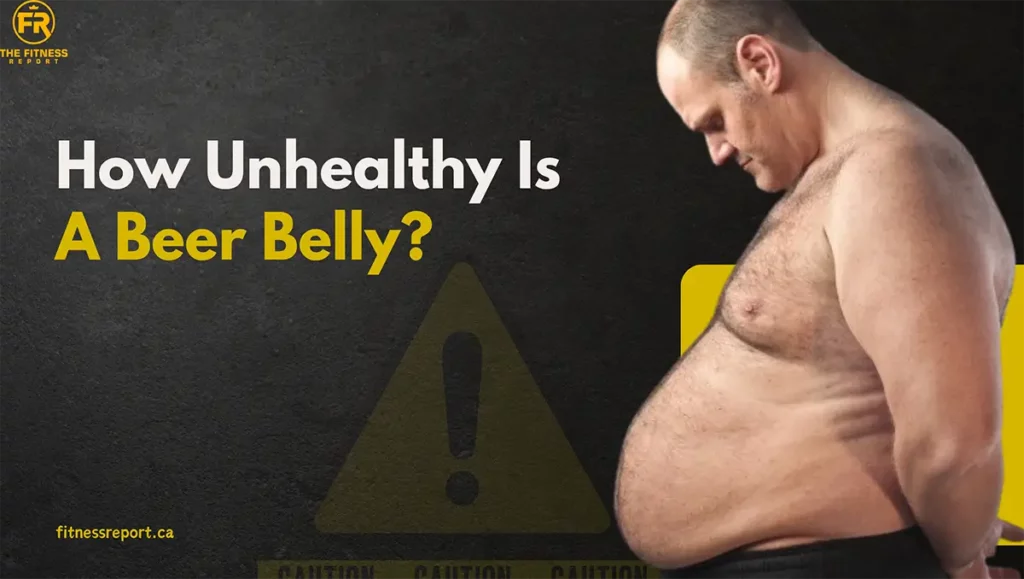
Visceral Fat
The fat that constitutes a beer belly is largely visceral fat, which accumulates around internal organs such as the liver, pancreas, and intestines. Visceral fat is more metabolically active than subcutaneous fat (the fat under the skin) and releases inflammatory compounds which can lead to health issues.
Increased Risk of Cardiovascular Diseases
A beer belly can elevate the risk of heart disease. Visceral fat releases fatty acids into the bloodstream, which can lead to cholesterol buildup, higher blood pressure, and insulin resistance.
Type 2 Diabetes
The beer belly’s visceral fat can reduce insulin sensitivity, making it harder for the body to regulate blood sugar levels. This can increase the risk of developing type 2 diabetes.
Higher Risk of Stroke
Excess belly fat has been linked to a greater risk of stroke, as it can contribute to arterial plaque buildup and hypertension.
Liver Concerns
Regular excessive alcohol consumption, a leading cause of beer belly, can lead to fatty liver disease, liver inflammation, and even cirrhosis.
Breathing Difficulties
A large beer belly can exert pressure on the diaphragm, leading to difficulty in breathing and sleep disorders like sleep apnea.
Hormonal Imbalance
Visceral fat can influence hormone production, potentially leading to hormonal imbalances that might increase the risk of certain cancers, such as breast and colon cancer.
Joint Pain
Carrying excess weight around the midsection can strain the back and joints, leading to chronic pain and posture problems.
Psychological Effects
Beyond physical health concerns, a beer belly can also impact mental well-being. Individuals might face issues with self-esteem, body image, and social interactions due to self-consciousness.
Can You Reverse A Beer Belly?

Yes, you can reverse a beer belly! While the development of a beer belly results from a combination of factors, including diet, alcohol consumption, and physical activity, it is possible to reduce and even eliminate it with the right strategies. Here’s how:
Dietary Adjustments
Reducing calorie intake, especially from processed foods and sugars such as those in an American diet, is crucial. Incorporate whole foods, lean proteins, vegetables, and whole grains into your diet. Controlling portion sizes and eating at regular intervals can also help.
Limit Alcohol Consumption
As the name suggests, beer and other alcoholic beverages contribute significantly to a beer belly. By eliminating alcohol intake, you can cut a significant source of empty calories.
Increase Physical Activity
Incorporate both cardiovascular exercises (like walking, running, swimming) and strength training routines. Cardio burns calories and fat, while strength training builds muscle, which boosts metabolism.
Stay Hydrated
Drinking plenty of water aids in digestion, supports metabolism, and helps in flushing out toxins.
Get Adequate Sleep
Poor sleep patterns can disrupt hormones that regulate appetite and fat storage. Aim for 7 to 9 hours of quality sleep per night.
Manage Stress
Chronic stress leads to elevated cortisol levels, a hormone linked to belly fat storage. Practices like meditation, deep breathing exercises, and yoga can help manage and reduce stress.
Avoid Smoking
Smoking is linked to the accumulation of belly fat. If you are a smoker, seeking help to quit can benefit both your waistline and overall health.
Consistency
Reversing a beer belly isn’t an overnight achievement. It requires consistent efforts in diet, exercise, and lifestyle changes.
How Do You Get Rid Of Beer Belly Fast?
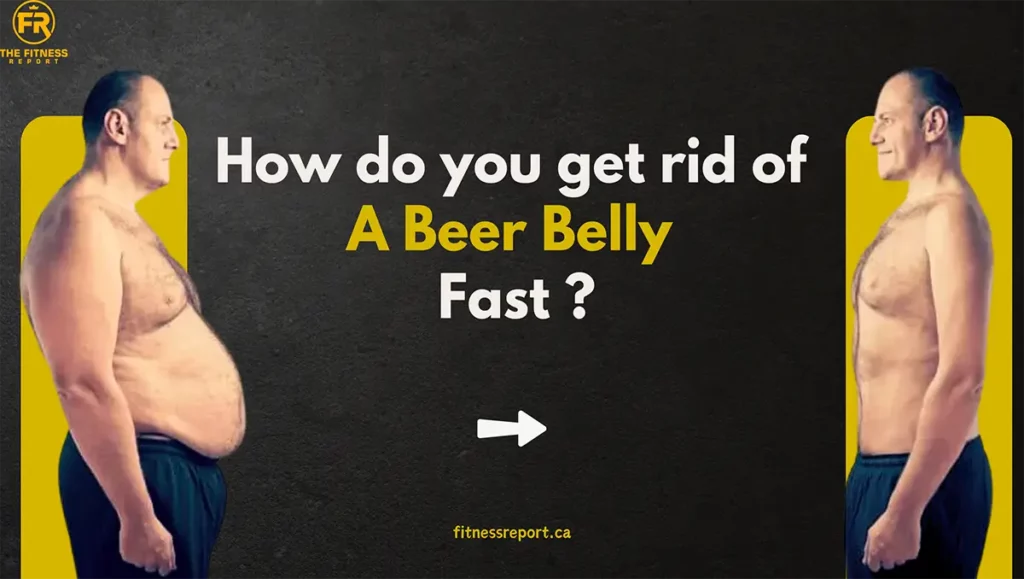
- Jumpstart the process by ditching beer and other alcohol. No booze means fewer empty calories.
- Embrace High-Intensity Interval Training. Short, intense workouts can torch fat faster than traditional exercises.
- Swap processed junk for whole foods. Think fresh over fried and baked over boxed.
- Amp up your protein game. It is not just for muscle; it keeps hunger at bay and metabolism in check.
- Drink water like it is your job. It flushes out toxins and revs up the metabolism.
- Curb those sweetened sips. Opt for water, herbal teas, or just a squeeze of lemon.
- Stress can pack on pounds, especially in the midsection. Find your zen moment, be it meditation or a simple stroll.
- Get your beauty sleep. 7 to 8 hours is the golden range to reset and help the body burn fat.
- Add weights to your workout. More muscles equal more calories burned, even at rest. Keep at it daily for best results.
How Long Will It Take For Beer Belly To Go Away?
- Initial Changes (2 to 4 weeks): With a strict regimen of a balanced diet and regular exercise, initial changes can be seen within a few weeks. This often includes reduced bloating and a slight decrease in waist circumference.
- Noticeable Reduction (1 to 3 months): With continued discipline, a more pronounced reduction in belly fat can be observed over several months. Incorporating both strength training exercises and cardio is crucial for optimal results.
- Significant Transformation (3 to 6 months): By consistently following a healthy lifestyle for half a year, individuals can achieve a significant transformation. However, visceral fat (the fat surrounding internal organs) might take longer to diminish completely.
- Full Reversion (6 to 12 months): For a complete reversal of a prominent beer belly, it might take anywhere from 6 to 12 months or even longer, depending on the individual’s commitment to diet, exercise, and avoiding alcohol.
Remember, everyone’s body is different, and factors such as age, genetics, starting weight, and metabolic rate can influence the rate at which the beer belly recedes. The key is persistence, consistency, and patience. Always consult a health or fitness professional when embarking on a weight loss journey.
Will I Lose Belly Fat If I Stop Drinking Alcohol?
Yes, cutting out alcohol can significantly aid in reducing belly fat, and here is why:
- Caloric Reduction: Any alcoholic drink, especially sugary cocktails and beers, is calorie-dense. By eliminating these from your diet, you reduce your overall calorie intake, which can contribute to weight loss.
- Improved Metabolism: Alcohol can slow down the body’s metabolic processes. Without alcohol, the body can burn calories more efficiently.
- Better Digestion: Alcohol can cause bloating and digestive issues. Cutting it out can lead to a flatter stomach simply by reducing bloating and improving gut health.
- Healthier Food Choices: Alcohol can impair judgment and lead to poorer food choices, like opting for greasy, high-calorie foods. Without alcohol, you are more likely to stick to a healthier diet.
- Reduced Fat Storage: Alcohol can elevate levels of cortisol, a stress hormone linked to fat storage in the belly. Additionally, the liver prioritizes metabolizing alcohol over processing fats, leading to fat storage.
- Improved Sleep Pattern: Alcohol can disrupt the sleep cycle. Better sleep is linked to better metabolic function and reduced weight gain.
How To Get Rid Of Beer Belly: Frequently Asked Questions (FAQs)
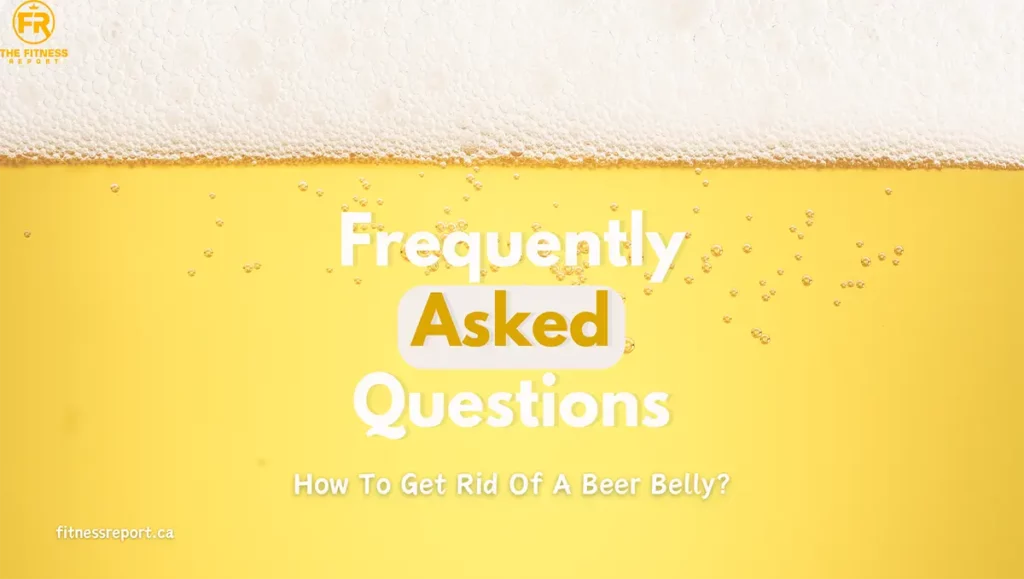
Endnote
The evidence is clear: consistent beer consumption has detrimental effects not only on our waistline but also on our overall health. The calories and metabolic disruptions caused by beer can lead to weight gain, particularly in the form of the dreaded beer belly.
Moreover, the broader health implications of regular alcohol intake cannot be ignored. To prioritize our health, physique, and long-term well-being, it is imperative to moderate or eliminate beer from our dietary choices.

